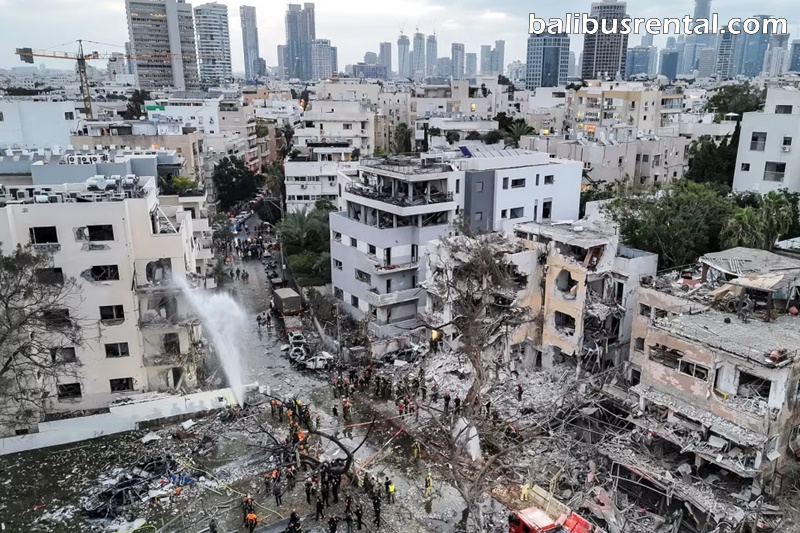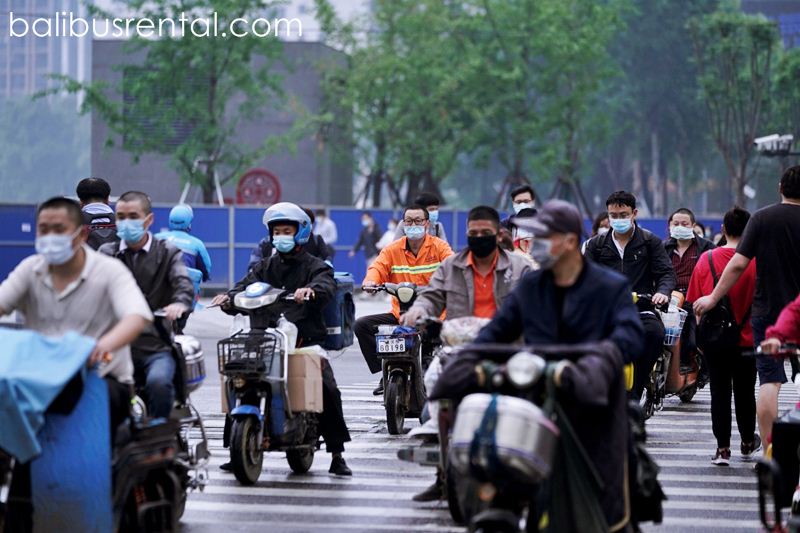Tuesday | June 17, 2025
Israel and Iran continued exchanging military strikes for a fifth consecutive day on Tuesday, deepening concerns about the potential for a wider war in the Middle East. The conflict has escalated into the worst direct confrontation between the two longtime regional adversaries, prompting urgent international calls for restraint.
U.S. President Donald Trump, addressing the situation, issued a stark warning on his Truth Social platform, urging civilians in Tehran to evacuate the city. He cited Iran’s rejection of a proposed nuclear deal as a critical failure that, in his view, could have prevented the current bloodshed.
“Iran should have signed the ‘deal’ I told them to sign. What a shame, and waste of human life. Simply stated, IRAN CAN NOT HAVE A NUCLEAR WEAPON. I said it over and over again! Everyone should immediately evacuate Tehran!” Trump posted.
At the G7 summit in Canada, global leaders expressed alarm over the spiraling violence. They unanimously emphasized that Iran must never acquire nuclear weapons, while simultaneously reaffirming Israel’s right to defend itself against missile and drone attacks. French President Emmanuel Macron revealed that Trump, who decided to cut his summit visit short to return to Washington, had floated a proposal for a ceasefire between Iran and Israel.
“There is an offer that has been made, especially to have a ceasefire and to initiate broader discussions. And I think this is a very good thing,” Macron said during a press briefing. “So now we need to see what the stakeholders will do.”
Despite the ongoing conflict, U.S. officials are reportedly exploring diplomatic channels. Axios reported that the White House is considering a possible meeting between U.S. special envoy Steve Witkoff and Iranian Foreign Minister Abbas Araghchi sometime this week. While Reuters could not independently verify the report, the possibility signals that back-channel negotiations may still be in motion.
U.S. Defense Secretary Pete Hegseth, speaking on Fox News, said that President Trump remains open to securing a nuclear agreement with Iran, but emphasized that the U.S. would protect its assets and personnel in the region if hostilities continue.
Meanwhile, tensions flared across Iran in the early hours of Tuesday. Iranian state media reported multiple explosions and heavy anti-aircraft fire over Tehran, with eyewitnesses noting rising smoke from the eastern part of the capital following what authorities described as incoming Israeli projectiles. Similar reports came from Natanz, the site of a major Iranian nuclear facility, where air defenses were also activated.
On Monday night, Israel confirmed it had struck the headquarters of Iran’s broadcasting authority. State television footage captured the moment a news anchor abruptly left her desk as a blast rocked the building. Iranian officials said the attack killed two people.
In Israel, air raid sirens were activated in Tel Aviv shortly after midnight, though no casualties or direct hits were reported. However, Israeli Finance Minister Bezalel Smotrich said that nearly 3,000 civilians had been evacuated from affected areas following repeated Iranian strikes.
The human toll continues to climb. Iranian officials report at least 224 fatalities—mostly civilians—over the past five days. Israel has reported 24 civilian deaths.
As the violence rages on, behind-the-scenes diplomacy is intensifying. Sources told Reuters that Iranian officials have appealed to Oman, Qatar, and Saudi Arabia to help mediate, asking them to press President Trump to urge Israeli Prime Minister Benjamin Netanyahu to agree to an immediate ceasefire. In return, Iran has signaled it would show flexibility in ongoing nuclear negotiations.
“If President Trump is genuine about diplomacy and interested in stopping this war, next steps are consequential,” Iranian Foreign Minister Abbas Araghchi posted on X (formerly Twitter). “Israel must halt its aggression, and absent a total cessation of military aggression against us, our responses will continue.”
Iran continues to deny that it seeks nuclear weapons, insisting that its nuclear program is for peaceful purposes and fully compliant with the Nuclear Non-Proliferation Treaty (NPT). Conversely, Israel, which is not a signatory to the NPT, is widely believed to possess nuclear weapons, though it maintains a policy of ambiguity and neither confirms nor denies its capabilities.
The conflict is also roiling global markets. Oil prices surged over 2% in Asian trading early Tuesday, reversing Monday’s losses, following Trump’s evacuation warning and reports that Iran might be considering a ceasefire.
With diplomacy hanging by a thread and military actions intensifying, the world watches with growing concern, hoping that both sides will step back from the brink before the conflict escalates beyond control.
CHINESE URGED TO LEAVE ISRAEL
As security conditions in Israel deteriorated further due to the ongoing war with Iran, the Chinese embassy in Tel Aviv issued an urgent call on Tuesday for its nationals to evacuate the country immediately via land border crossings. The advisory underscored growing international concern as the conflict between the two regional powers reached an unprecedented scale.
The Iran-Israel air war—now widely considered the most intense confrontation between the two bitter rivals in modern history—intensified on Monday with a new wave of strikes by Israel. Among the targets were Iran’s state-run broadcasting headquarters and key uranium enrichment facilities, signaling a major escalation in both military and symbolic terms.
Rafael Grossi, Director General of the International Atomic Energy Agency (IAEA), confirmed in an interview with the BBC that the Natanz nuclear facility had suffered catastrophic damage. He estimated that up to 15,000 centrifuges used for uranium enrichment were destroyed, a major blow to Iran’s nuclear infrastructure. However, Grossi noted that Iran’s Fordow facility—another high-security nuclear site buried deep inside a mountain—appeared to have remained largely unscathed.
The rising tensions have derailed planned diplomatic efforts. Back-channel negotiations between the United States and Iran, which were to be hosted by Oman on June 15, were abruptly canceled. Tehran stated it could not enter into talks while under sustained military attack, effectively shutting down one of the few remaining diplomatic avenues.
The conflict began when Israel launched a surprise, large-scale aerial assault that reportedly decimated Iran’s senior military leadership and eliminated several of the country’s top nuclear scientists. Israeli officials claim the initial strikes were designed to dismantle Iran’s ability to retaliate or escalate the conflict, and now assert that they have established control over segments of Iranian airspace. Israeli military spokespeople have signaled that their campaign will not only continue but expand in the coming days.
“The goal is clear: to permanently degrade Iran’s capacity to threaten Israeli territory and global stability,” an Israeli Defense Forces (IDF) official said on condition of anonymity.
U.S. President Donald Trump, who has publicly backed Israel’s right to defend itself, reiterated that the war could end swiftly—if Iran concedes to long-standing American demands. Those include agreeing to stringent limitations on its nuclear program, more invasive inspections, and the abandonment of uranium enrichment beyond civilian use.
“Israel’s actions are defensive and necessary. This can all stop—right now—if Iran does the right thing and signs the deal,” Trump said during a televised interview. “I’ve been clear all along: Iran must not have a nuclear weapon. We are not negotiating under fire, but we are open to peace if Iran is serious.”
In the meantime, the humanitarian toll continues to mount on both sides. Civilian casualties are rising, and both Israel and Iran have implemented partial evacuations of their urban centers. International airports in Tel Aviv and Tehran remain closed, and airspace over large parts of the region has been deemed unsafe by global aviation authorities. Several countries—including the United States, Germany, and India—have advised their citizens to leave Israel and Iran as soon as possible.
With conventional diplomacy at a standstill and the threat of broader regional war looming, observers fear the situation may spiral further out of control unless immediate de-escalation steps are taken. For now, the world remains on edge, watching one of the Middle East’s most volatile chapters unfold in real time.




